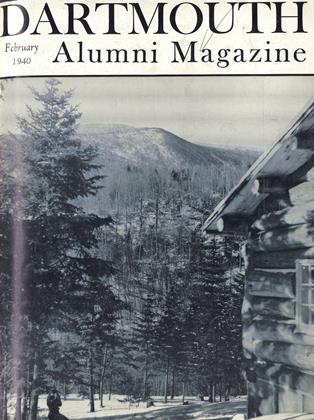by John HenryBartlett '94. M. A. Donahue & Co., Chicago and New York, 1939. pp. xvi, 175. #2.50.
No one who has travelled, even lightly and for pleasure, the paths of New Hampshire politics has gone far without at least hearing of the author of this book. Indeed, his chances of becoming a legend are more than fair, and the tales of his countless devices as politician and orator have almost assumed the proportions of a saga. Once, at a meeting a few years ago, when the audience seemed frozen in apathy, Governor Bartlett suddenly made a charge of opposition corruption so startling, so brazen, and so unbelievable that everybody gasped, particularly his fellow speakers. "And if anybody denies my statement," with a solemn pause, "I'll retract it immediately!" And from then on what a rally that was.
Somehow, New Hampshire air induces an interest in politics, and Mr. Bartlett must have brought it with him from Sunapee to Dartmouth, where he led the Republican undergraduates in the campaign of 1892. After college, that often successful combination of law and politics led him through various offices to election as Governor in 1918. Since then he has served as United States Civil Service Commissioner, as first assistant postmaster-general, under Harding and Coolidge, and as a member since 1929 of the International Joint Commission for the United States and Canada. From this he recently resigned.
Mr. Bartlett has also over the years found time to write, beginning with his "Dartmouth Athletics" while at Hanover. One of his later books, "Folks is Folks," is worth special mention for those interested in a vanishing era. In the present volume he has combined his interest in politics and literature to produce a new history of the state. It is not complete and it does not claim to be, but it does contain a great deal of information. It starts with Captain John Smith in 1614, sketches the
political story to the present time, and covers briefly the developments in education, banking, the courts, and the growth of cities. It tells something of a few of New Hampshire's great men. As a concise history, it should prove useful. Two things keep it from being merely a compendium of information—a large number of pictures, and the frequent shrewd observations. Those on the period of the author'sown political experience are especially interesting, and suggest that he ought to expand them, perhaps into an autobiography, so that the opportunity he has had of watching state and national politics for the past fifty years may be passed on, indirectly, to us.
 View Full Issue
View Full Issue
More From This Issue
-
 Article
ArticleMore Than Professor
February 1940 By JOHN HURD JR. '21 -
 Article
ArticleThe College In The Sixties
February 1940 -
 Class Notes
Class Notes1915*
February 1940 By CHARLES R. TAPLIN -
 Article
ArticleEducation Without Books
February 1940 By Davis Jackson '36 -
 Sports
SportsBig Green Teams
February 1940 By Whitey Fuller '37 -
 Article
ArticleHanover Browsing
February 1940 By HERBERT F. WEST '22
Herbert W. Hill
-
 Letters to the Editor
Letters to the EditorLetters
February 1940 -
 Article
ArticleFifth Hanover Holiday
February 1941 By HERBERT W. HILL -
 Article
ArticleHanover Holiday, May 11-15
February 1942 By HERBERT W. HILL -
 Books
BooksPRECISION VALLEY: THE MACHINE TOOL COMPANIES OF SPRINGFIFLD VERMONT.
February 1960 By HERBERT W. HILL -
 Books
BooksMITRE AND SCEPTRE.
MARCH 1963 By HERBERT W. HILL -
 Books
BooksYESTERDAY'S RULERS: THE MAKING OF THE BRITISH COLONIAL SERV ICE.
OCTOBER 1963 By HERBERT W. HILL
Books
-
 Books
BooksAlumni Articles
April 1946 -
 Books
BooksCHALLENGE AND PERSPECTIVE IN HIGHER EDUCATION.
MAY 1971 By ARTHUR E. JENSEN -
 Books
BooksTHE CHRISTIAN FUTURE, OR THE MODERN MIND OUTRUN
June 1946 By C. Page Smith '40. -
 Books
BooksTHE WORLD, THE WORLDLESS.
JUNE 1965 By F. CUDWORTH FLINT -
 Books
BooksAMERICAN WOMEN: A STORY Of SOCIAL CHANGE.
OCTOBER 1970 By Katherine Lever -
 Books
BooksMATHEMATICAL THEORY OF FINANCE
APRIL 1929 By Louis C. Mathewson


